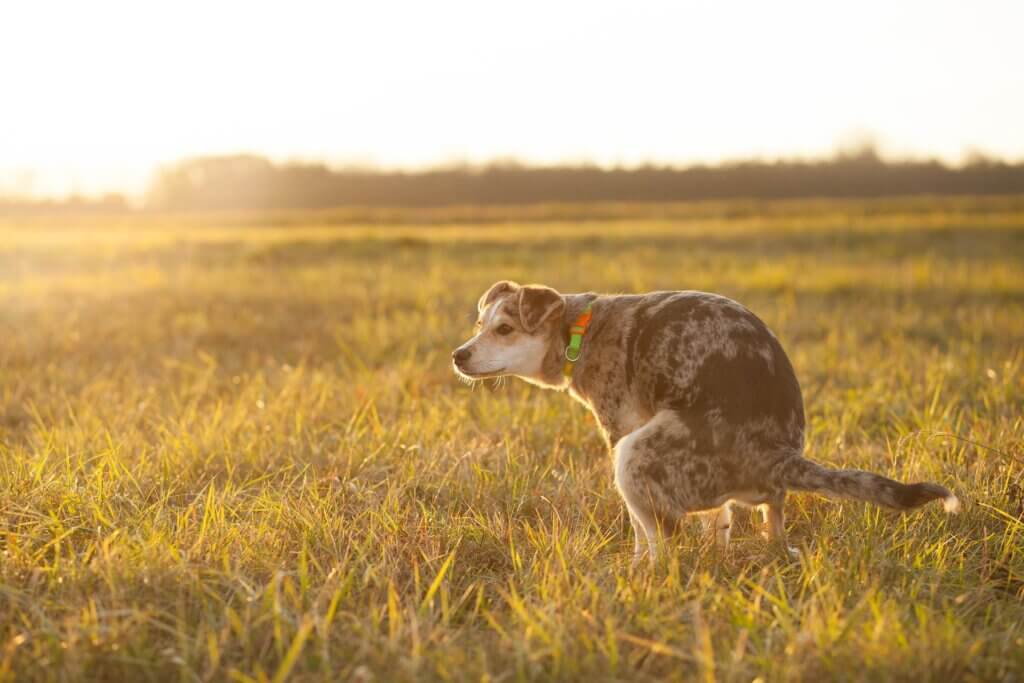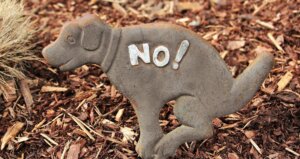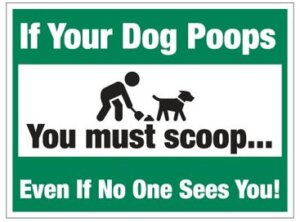12 Crazy Doggy Doo Facts

As proud members of the Association of Professional Animal Waste Specialists, Super Scoopers knows a lot about doggy doo. It’s our “doody” to clean up the poo of many Texas dogs.
It’s a dirty job, but somebody has to do it. If dog owners don’t clean up dog poop themselves or hire someone like us to do it, the dog poop remains on the ground, causing all sorts of problems.
You may be thinking, “Everybody poops. What’s the big deal with doggy doo?” The big deal is that dogs can’t use toilets and their poop contains harmful bacteria.
Keep reading to be shocked and horrified by the state of doggy doo in the USA.
Dogs poop a lot.
Most dogs poop once a day, but some poop three times a day. It adds up.
Statistics suggest that the average dog produces 274 pounds of waste annually.
This means that if your dog lives for 15 years, your dog will 4,110 pounds of poop in his lifetime.
There are tons of doggy doo in America.
Now take those numbers and multiply them.
For example, one study claims, “72 million dogs in the US produce over 8 billion pounds of waste each year.”
According to UCLA, the amount of pet waste produced in the US is on par with how much trash the entire population of Massachusetts produces.
Dog poop contains dangerous bacteria.
All that doggy doo contains dangerous bacteria.
The Department of Energy and Environment explains, “Pet waste contains bacteria and parasites that infect people and pets including food poisoning, tapeworm and hookworm. These diseases can be especially dangerous for children, elderly, and people who have compromised immune systems. A dime’s worth of dog poop contains 23 million fecal coliform bacteria, such as E. coli.”
Doggy doo is not good for your yard.
With all those bacteria, it’s clear dog poop isn’t good for your yard.
This bacterium gets into your yard and can easily be tracked inside your home.
Unfortunately, there is a widespread myth that dog poop makes good fertilizer.
Dog poop is not manure. It is extremely harmful and dangerous to people, animals, and water sources.
It also isn’t smart to simply mow over it. If you mow your lawn with dog poop in it, it cuts and spreads the bacteria-filled poop across your entire yard. This is the opposite of what you want.
Dog poop is a pollutant.
Think we are overexaggerating because we own a pooper scooper business? Wrong.
Pet waste was listed as a nonpoint source pollutant by the EPA in 1991.
Rodents love doggy doo.
The piles of poop you have in your yard are very appealing to rodents.
If you don’t want a rodent issue, you need to scoop the poop routinely.
Dog poop routinely harms our water sources.
One of the biggest concerns of dog poop is water contamination. Unfortunately, it is a regular occurrence.
The UW School of Marine and Environmental Affairs explains, “In just a few days, 100 dogs can produce enough bacteria that, if left on the ground, could wash into the ocean and temporarily close a bay, and all watershed areas within a 20-mile radius, to fishing and swimming! […] In Seattle waters, about 90% of harmful bacteria can be attributed more broadly to animals, and between 20% and 30% can be directly blamed on dogs (or more appropriately, on the dog owners who neglect to pick up poo).”
Dog poop contains DNA.
Speaking of dog owners who neglect to pick up poo…
There are now companies that use dog DNA to identify those from whom those left behind piles of poo came.
Some communities are even requiring residents to submit their dog’s DNA for this very reason!
Vets can tell a lot about your dog’s health by their poo.
Veterinarians tend to collect stool samples. That’s because they can tell a whole lot from your dog’s poop.
Vet Source explains, “Poop can be evaluated by the 4 Cs. This includes color (from brown to yellow and beyond), consistency (rated on a scale of 1 to 7, with 1 being rock hard and 7 diarrhea), content (such as fur, worms, or foreign objects), and coating (whether there is a film on the poop).”
Dog poop does not decompose quickly.
Many dog owners falsely believe that they can just let the dog poop decompose.
While we’ve already pointed out the dangers of bacteria, some people fail to realize just how long it takes dog poop to decompose.
For example, it takes an average of 9 weeks for dog poop to decompose. But it can take as long as a year for it to decompose depending on the climate and your dog’s diet.
Many dog owners don’t dispose of their dog’s poo.
Sadly, about 40% of dog owners do not dispose of their dog’s poop.
That means they leave the poop behind to decompose, spread harmful bacteria, and wind up on an innocent bystander’s shoes.
Dog poop removal services are growing in popularity.
With pooper scooper services available, it makes no sense for lingering dog poop to be an issue.
Pooper scooper services make it possible for even the busiest families to keep their yards safe and clean.
That’s why pooper scooper businesses are growing in popularity. Check out our reviews to see why you should sign up for regular scooping service.
At Super Scoopers, we take pride in our work. We aim to make your life easier by taking the burden of doggy doo cleanup off their hands.





